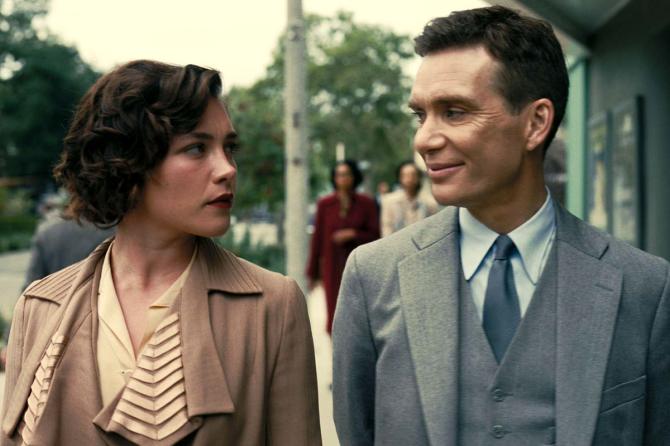Oppenheimer is a very politically significant film for our time, observes Utkarsh Mishra.

When 'American Prometheus' Dr J Robert Oppenheimer decided to lead the Manhattan Project to make the world's first atomic bomb, the scientist community in most of Europe and America was perplexed by a moral dilemma.
Whether or not the 'good guys' should create an ultimate weapon that deters the 'bad guys' enough to make them fall in line?
But there's a flip side to it.
What if the 'bad guys' get the weapon first?
Or worse, what if it doesn't prove a deterrent at all and, au contraire, it starts a vicious arms race in which either side is always looking to outsmart the other.
And, most important, who can be called the 'good guys' here? Sure, when fighting against Hitler, even Stalin seems to be on the just side.
But what after the defeat of Nazism?
History is replete with examples that could decisively end this dilemma, and yet, this question keeps arising at different times.
After all, just as we all thought that the world is weaponised enough to deter a full-scale conventional war, we had Russia marching into Ukraine with tanks and troops, unleashing destruction on a scale that was not seen in Europe since the end of the Second World War.
Christopher Nolan's latest historical drama Oppenheimer, based on the life of the 'Father of the Atomic Bomb', deals mainly with the philosophical, social and political aspects of this dilemma.
It is based on the book American Prometheus: The Triumph and Tragedy of J Robert Oppenheimer by Kai Bird and Martin J Sherwin.
What is now largely known about Dr Oppenheimer is that he always struggled with a conflict in his head.
First, he was at conflict with his own identity.
He was born to German Jewish parents who were settled in New York and were wealthier than most of their peers.
Robert never spoke Yiddish or German at home, he never lived in a ghetto like many of his people and perhaps never felt that sense of distinction for being Jewish.
Yet, he was often seen only as a German Jew by most people of his community and outside.
Another conflict that defined his personality and which the movie mainly deals with is the idea of unleashing the forces of nature on humankind in the form of a weapon.
Nolan has represented this conflict in his characteristic style, where you actually feel the tension, the predicament and the friction that the protagonist is dealing with.
It is aided by Cillian Murphy's sublime portrayal of Dr Oppenheimer as well as an apt background score, and sometimes the lack of it, as in the scene depicting the Trinity Test.
Unlike the politicians, Dr Oppenheimer and other scientists were fully aware of the annihilating power of the weapon they were developing.
Yet, he was convinced, at least in the beginning, that it is essential for them to have this weapon before the Nazis. And though he would be giving humankind the power to destroy itself, it will end the war, not just the one they were fighting, but all future wars as well.
A few other intellectual giants of his time were less convinced of this prospect than Dr Oppenheimer.
Although it was Albert Einstein whose letter to President Franklin Delano Roosevelt about the Nazis possibly developing an atomic bomb got the latter to turn his attention towards what later became the Manhattan Project, 'the father of modern physics' was not very enthusiastic about the idea.
On the German side, Werner Heisenberg, who was asked by the Third Reich about the possibility of such a weapon, was imploring his former teacher Niels Bohr to tell him if the Allies are also working on a similar project. So that he may have a clear conscience while deciding on whether to go ahead or not.
Nolan's movie has a scene where Bohr mentions this conversation to Oppenheimer, while making his disapproval of the idea clear. (This conversation has been covered in detail in the 2002 television film Copenhagen, based on Michael Frayn's play, which has Daniel Craig playing Heisenberg and Stephen Rea playing Bohr.)
However, all these great minds of the 20th century, from Einstein to Feynman, Oppenheimer to Enrico Fermi, Heisenberg to Otto Hahn, either directly or through their discoveries, paved the way for the creation of the atomic bomb.
Are they the ones to blame for Hiroshima and Nagasaki, and the current stockpile of nuclear weapons that the world is sitting on?
After all, as Oppenheimer once said, 'Our work has changed the conditions in which men live but the use of those changes is the problem of governments, not of scientists.'
The movie also shows that when, after the explosions in Hiroshima and Nagasaki, a conscience-stricken Oppenheimer goes to President Truman and laments that he has blood on his hands, the latter rebuffs him saying it was he who decided to drop those bombs and not Oppenheimer.
Although Oppenheimer made the aforesaid remarks in 1961, before Hiroshima, he was convinced that 'they won't fear it until they saw it'. So he knew that the weapon had to be put to actual use. And once it is used, he will be the one to be blamed.
He quotes the Bhagavad Gita to declare, 'Now I am become death' (Oppenheimer found the Hindu scriptures so inspiring that he learned Sanskrit in order to read them in their original language).
He hoped to end the war with a demonstration of this death.
But the annihilation of Hiroshima and Nagasaki, as well as the realisation that the people whom he trusted with this enormous weapon would not exercise the restraint that he expected them to do, forced Oppenheimer to reconsider his position. And he became a vociferous opponent of atomic weapons.
And that's when he suddenly became dangerous to the same politics to which he was hitherto essential.
His influence on atomic policy was counterproductive for the 'country's interest' during the Cold War. And, in the McCarthy era, it became increasingly simple to target him for his past association with Communism.
Nolan's film perfectly captures these moral quandaries and political skullduggery.
The latter part of the film deals with the witch-hunting of Oppenheimer for his opposition to the country's H-bomb programme.
Apart from Murphy, it has Matt Damon playing Leslie Groves, the general who directed the Manhattan Project and the man behind the decision to drop two atomic bombs on Japan and not one, lest the enemy should think that it was a unique exercise; and a hard-to-recognise Robert Downey Jr playing Lewis Strauss, the chairman of the Atomic Energy Commission, who sought to settle personal as well as political scores with Oppenheimer by secretly passing on information that led to his security clearance being cancelled.
All the segments involving Robert Downey Jr are in black and white, unlike the rest of the movie. Something that reminds one of Nolan's Memento.
What makes the movie stand out is that it never actually shows the destruction caused by the two bombs.
It doesn't even show the explosion.
Yet, it's the power of Nolan's direction that the audience live that experience, without actually seeing it.
The scene showing the Trinity test has no background score.
Yet, when it played, there was a pin-drop silence in the packed theatre where I was watching the film.
Similarly, one scene where he is applauded for ending the war, shows Oppenheimer having visions of what it must have felt to experience those explosions. And that is enough to make one flinch with disgust at the thought of what would happen if a nuclear weapon is used.
Thus, it is also a very politically significant film for our time. Not only that we have some eccentric leaders who have access to these weapons, but this debate of 'good guys with big bombs as deterrent for bad guys' has never left the discourse.
The Allies must have it before the Nazis do, the US must have it before the Soviets do, India must have it before Pakistan does, Israel must have it before Iran does, it never stopped. And will never stop as new conflicts emerge.
One might argue that, so far, the armament on both sides has ensured that neither puts it to use.
But isn't it a matter of time when someone chooses to 'become death'?
Well, they have all the means to do so now.













 © 2025
© 2025